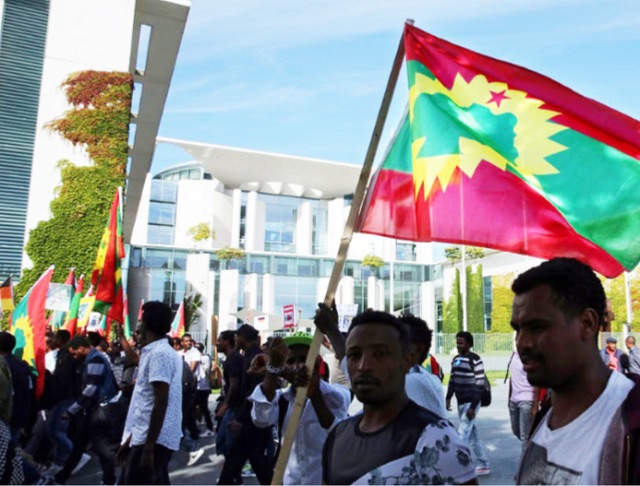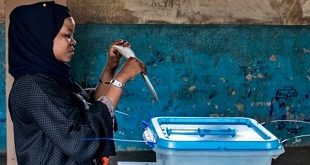
Following the award of the Nobel Prize, Schadomsky said “The grumpy autocrat from Asmara, who ruthlessly keeps his own people in chains so he can remain in power, is unlikely to enjoy being snubbed under the eyes of the world by a charismatic politician half his age”.
“So Abiy has received the most prestigious peace prize for a peace that exists, predominantly, only on paper,” Schadomsky wrote, “Worse still: the award could, eventually, even torpedo those peace efforts, if the Eritrean leadership felt put under pressure to an even greater extent than before.” Schadomsky article was titled: “Nobel Peace Prize for Abiy Ahmed a misguided decision”.
Human Rights watch has also described Abiy’s Nobel Prize as “bittersweet” for many in Ethiopia and neighboring countries. Laetitia Bader, HRW’s Senior Researcher, Africa Division, wrote that the international acclaim bestowed by the Nobel Prize may be premature. She argued that although “Abiy deserves praise, many rights reforms are still needed” in Ethiopia.
“The Nobel Prize should remind Abiy, all Ethiopians, and the country’s international partners of his wide-ranging reform agenda. It should also serve as a call to action for Abiy and his government to redouble efforts to ensure the reforms have meaningful, lasting impact,” Bader says.
Going forward, many Ethiopians fear the ruling coalition, the Ethiopian People’s Revolutionary Democratic Front (EPRDF), is unlikely to become wholly progressive in the short-run. Abiy is the EPRDF’s fourth leader and it has always positioned itself as the lone player in a closed political space. Its members have been reluctant to embrace Abiy’s reforms.
Complex politics
Ethiopia is administratively divided into nine ethno-linguistically based regional states and two chartered cities. The states are: Afar; Amhara, Benishangul/Gumaz, Gambela, Harar, Oromia, Somali, Tigray and the Southern Nations, Nationalities, and Peoples Region. The chartered cities are Addis Ababa, the country’s capital, and Dire Dawa.
The four political parties in the EPRDF are from four of the regional states; namely Tigray People’s Liberation Front (TPLF), Amhara Democratic Party (ADP), Oromo Democratic Party (ODP) which Abiy heads, and the Southern Ethiopian People’s Democratic Movement (SEPDM).
So the five regions that have remained locked out as Abiy formed government with only four out of nine remain restless and feeling marginalised.
Political consensus is not easy to forge in Ethiopia because it has a complex federal parliamentary government headed by the prime minister who is chosen by parliament. The parliament has two chambers; the 108-seat house of federation and the 547-seat House of Peoples Representatives.
Members of the house of federation are chosen by the regional state assemblies to serve five year terms and members of the house of people’s representatives are directly elected by the population. The people’s representatives elect the president for a six-year term.
Abiy is an elected member of the Ethiopian parliament on the Oromo Democratic Party (ODP) ticket. By most measures, Abiy’s life reflects the complexity of Ethiopian social and political life.
His full name is Abiyyii Ahimad Alii in his native Oromo. His childhood name was Abiyot, meaning “Revolution” in English. His father, Ahmed Ali, was a Muslim Oromo while his mother, Tezeta Wolde, was an Orthodox Christian Amhara. Abiy is a devout Evangelical Pentecostal Christian of the Full Gospel Believers’ Church. His wife, Zinash Tayachew, is an Amhara. They met while both were serving in the Ethiopian Defense Forces. Abiy is a former intelligence officer.
Abiy has a degree in computer engineering, a Master’s in Transformational Leadership, and a Master of Business Administration. But his specialty is conflict de-escalation strategies in the Horn of Africa and countering of violent extremism. He has a Doctor of Philosophy (Ph.D.) from the Institute for Peace and Security Studies of Addis Ababa University. His thesis was entitled “Social Capital and its Role in Traditional Conflict Resolution in Ethiopia: The Case of Inter-Religious Conflict in Jimma Zone State”. He will need those skills if he is to live up to the expectations winning the Nobel peace Prize has placed on him.
****
 The Independent Uganda: You get the Truth we Pay the Price
The Independent Uganda: You get the Truth we Pay the Price



Our prayers
Hitler, Stalin and Mugabe were also nominated for the prize.